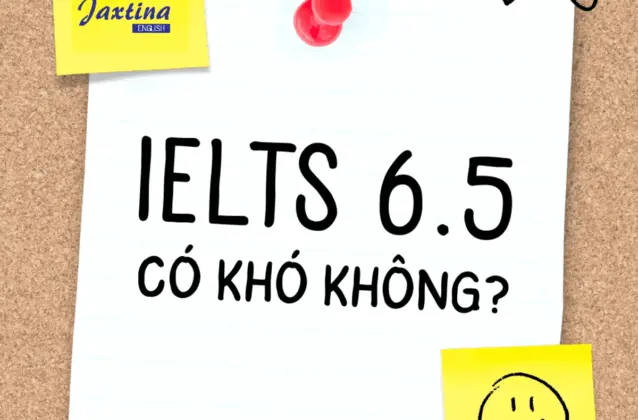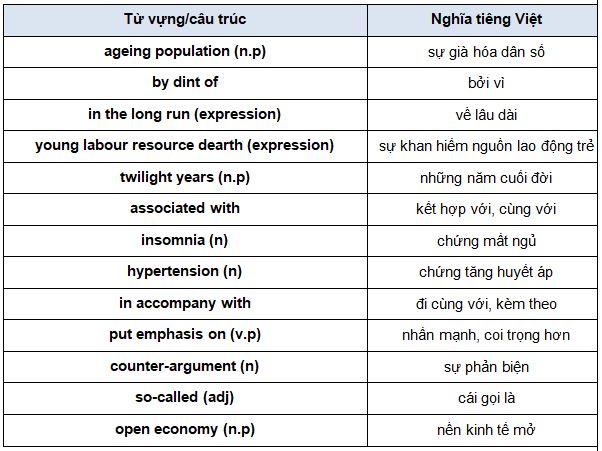

Lỗi lặp từ tiếng Anh trong IELTS Writing thường bị coi là một lỗi rất lớn trong IELTS. Nếu bài viết của bạn thường xuyên bị lặp từ giữa các câu, các đoạn, giám khảo sẽ ngay lập tức đánh giá bạn là người có vốn từ nghèo nàn, không nắm được các từ đồng nghĩa, không biết paraphrase,… khiến bài viết của bạn có thể bị trừ điểm nặng. Trong bài viết chia sẻ mẹo luyện thi IELTS cấp tốc hôm nay, Jaxtina sẽ hướng dẫn bạn một số cách khác giúp tránh lặp từ hiệu quả trong bài thi IELTS Writing.
Mục lục bài viết
ToggleMột số cách tránh lặp từ
Một só cách giúp bạn tránh lặp từ khi làm IELTS Writing:
Cách 1: Sử dụng từ thay thế (Substitution)
Ví dụ:
Do you think in the future, human workforce will be replaced by machines? – I hope not.
=> Not là từ thay thế cho “human workforce will be replaced by machines”
Will this crisis situation be handled soon? – I think so.
=> So là từ thay thế cho “this crisis situation will be handled soon”
I never have much experience in designing print-ads. Neither/nor my co-worker.
=> Neither/Nor là từ thay thế cho “have much experience in designing print-ads”
We don’t encourage that kind of irresponsible behavior in class. But some parents do.
=> Do là từ thay thế cho “encourage that kind of irresponsible behavior”
>>>> Tham Khảo Thêm: Cách luyện Writing IELTS tại nhà cực hiệu quả trong 3 tháng
Cách 2: Sử dụng phép lược từ (Ellipsis)
Phép lược từ (ellipsis) có thể hiểu là sự lược bỏ một từ/cụm từ không cần thiết mà không làm thay đổi bản chất, ngữ nghĩa của câu.
Ví dụ: There are two things that I remember the most from my childhood. The first is… The second is …
=> Từ “things I remember the most from my childhood” được bỏ bớt đi, chỉ còn lại the first, the second.
Một số phép lược từ phổ biến:
1. Lược bớt Chủ ngữ để cấu trúc câu trở thành: Subject + Verb 1 + Verb 2 …
Ví dụ: I went through all the details and I look for something abnormal.
=> Lược thành: I went through all the details and look for something abnormal.
2. Lược bớt Động từ
Ví dụ: Recently I don’t have time to go swimming. But I used to.
=> sau used to được lượt bớt phần “go swimming” ở vế sau.
3. Sử dụng Modal Verb thay cho Động từ chính
Ví dụ: Nowadays, parents don’t forbid their little children to use smartphones or laptops to go online. But I think they should.
=> should là viết tắt cho cả cụm “they should forbid their little children to use smartphone or laptop to go online”
>>>> Tìm Hiểu Thêm: Những cụm từ không nên dùng trong IELTS Writing
Cách 3: Sử dụng đại từ THAT hoặc THOSE thay thế danh từ
Ví dụ:
The unemployment rate in Hanoi this year is similar to that of 3 years ago.
→ That thay cho “The unemployment rate”
The work efficiency ratings of this team are far better than those of the other team.
→ Those thay cho “The work efficiency ratings”
Cách 4: Sử dụng THOSE đứng trước WHO
Ví dụ: For those who make the booking early, the better promotion will be given.
→ Those thay cho “The people”, trong trường hợp trước đó đã nhắc đến cụm “The people” rồi.
Cách 5: Dùng “THE FORMER” hoặc “THE LATTER”
The former có nghĩa là “vế trước, người thứ trước“, trong khi the latter có nghĩa là “vế sau, người đến sau“
Ví dụ:
You will either be the conqueror, or be conquered. I’d rather be the former.
=> The former thay thế cho việc lặp lại từ “the conqueror”
I have watched both Interstellar and The Martian, but I prefer the former over the latter.
=> The former thay thế cho việc lặp lại từ “Interstellar”, còn the latter thay thế cho việc lặp lại “The Martian”
LƯU Ý: Bạn chỉ được dùng 2 từ này khi nói đến những sự vật, sự việc hoặc người đã được nhắc đến từ trước. Nếu chưa từng đề cập đến chúng từ trước, bạn chỉ cần dùng the first, the second, the last là đủ.
Ví dụ: That director has made 5 movies in his whole career. The first three are terrible, but the last two are masterpieces.
Cách 6: Dùng cấu trúc “THIS/THESE + DANH TỪ THAY THẾ”
Ví dụ:
Smartphones and laptops have provided us several benefits that make our life easier. First of all, these devices allow us to connect to the internet no matter where we are.
=> These devices thay thế cho “Smartphones and laptops”
The number of Facebook users in the USA was at the lowest, at 40% of the total population in this country.
=> This country giúp tránh phải nhắc lại từ “the USA”
Cách 7: Thay đổi cấu trúc câu
Để tránh bị lặp, không nhất thiết bạn phải thay 1 từ bằng 1 từ mới hoàn toàn. Bạn có thể sử dụng các dạng/thể khác nhau của từ đã dùng, và thay đổi cấu trúc câu để hợp lý hoá các dạng/thể từ đó.
Ví dụ: It is true that obesity among children is growing to be a serious problem in developed countries.
=> In many advanced countries, obesity in children has become a serious issue.
Cách 8: Sử dụng từ đồng nghĩa (Synonyms)
Để có vốn từ đồng nghĩa tốt mà sử dụng trong bài thi IELTS, thực sự không có cách nào khác ngoài việc bạn phải học từ chăm chỉ. Dưới đây là từ đồng nghĩa của một vài từ thông dụng trong IELTS Writing:
| And: In addition to, besides, additionally, likewise, furthermore, moreover, additionally.
Or: Else, otherwise, alternatively, instead, as a substitute. But: On the other hand, then again, on the contrary, in contrast, however, then again, in spite of that, nonetheless, instead, even so, alternatively. Because: Given that, as, since, for the reason that. Hence: Thus, so, likewise, therefore, consequently, for this reason, above and beyond. Then: After that, it follows that, followed by, subsequently, afterward/afterwards, therefore. In fact: As a matter of fact, actually, in reality, essentially, in truth, indeed, in effect, Conclude: To sum up, wrap up, deduce, to draw a conclusion. Exemplify: Illustrate, demonstrate, represent, embody, epitomise, show. Agree: Consent, approve, concur, harmonise, be in accord, endorse, support, back up. Disagree: Deny, refute, reject, repudiate, renounce, contradict, disapprove, oppose. Rise: Increase, grow, go up, mount, ascend, upsurge, spread, and intensify, get higher. Arise: Develop, evolve, happen, occur, take place, appear. Decline: Reject, decrease, diminish, refuse, minimise, fall, lessen, turn down. Vary: Differ, fluctuate, diverge, show a discrepancy, change, alter, contrast. Do: Carry out, accomplish, perform, act, take action, take steps, play a part, execute, act upon, produce a result. Fail: Be unsuccessful, abort, end, terminate. Help: Aid, assist, support, lend a hand, abet. Need: Demand, want, require, necessitate, requirement, requisite, fundamental. Good: Fine, superior, excellent, decent, high quality, first class, moral, upright, noble, worthy, pleasant, delightful, advantageous, useful, fair, benefit. Bad: Terrible, awful, dreadful, ghastly, evil, wicked, poor, inferior, flawed, troublesome, mischievous, regretful, guilty, injurious, harmful, adverse, rotten, rancid. |
Lưu ý về việc lặp từ trong IELTS WRITING
1. Không suy nghĩ theo kiểu “1 từ đã dùng thì nhất định không được dùng lại lần 2”
Trong bài IELTS Writing, bạn có thể lặp từ ở một mức độ nhất định, không cần phải quá cố gắng “nặn” ra cách diễn đạt mới mỗi lần cần phải dùng 1 từ gì đó đã viết sẵn ở trước. Một là trình độ từ vựng của chúng ta e mà khó có thể giỏi được đến mức đó, Hai là khi làm vậy bài viết sẽ khá là gượng gạo, không tự nhiên.
2. Hãy thận trọng khi thay đổi nghĩa của từ
Ví dụ E-learning, distance learning và online learning là 3 thuật ngữ không hoàn toàn đồng nhất. Tuỳ mỗi văn cảnh mà bạn có thể sử dụng sao cho phù hợp, nhưng đừng dùng chúng để thay thế vô tội vạ lẫn nhau.
3. Keyword là từ mà bạn được phép lặp
Trong một số trường hợp, từ khóa quan trọng của Topic là thứ mà bạn có thể lặp lại mà không ai cảm thấy phiền (trừ phi bạn lặp lại quá nhiều, câu nào cũng có).
Ví dụ với bài IELTS Writing Task 2 về chủ đề Technology, việc lặp lại từ này là bình thường. Bạn không thể thay thế Technology bằng từ Hi-tech vì nó có nghĩa khác nhau.
Trên đây là một vài cách giúp tránh lỗi lặp từ trong IELTS Writing mà bạn nên biết khi luyện thi IELTS cho người mới bắt đầu. Bây giờ hãy cùng thử sức với một bài luyện tập IELTS Writing Task 2 nào!
Bài tập ứng dụng
Do the following task (Làm theo yêu cầu dưới đây.)
In many countries, the proportion of older people is steadily increasing. Does this trend have more positive or negative effects on society?
Xem đáp án
Đáp án tham khảo:
The phenomenon of an aging population is gaining ground in developed nations where longevity is lengthened greatly by dint of higher living standards, better health care, and serene life. Some people fear that this trend may cause a threat to society in the long run for its cause of young labour resource dearth while others view it as inevitable and see positive effects of this issue. My essay will analyze both the good and bad sides of this problem.First of all, it is believed that the longer people live, the more they enjoy their lives. After years of diligence and contributions, the idea of taking a comfortable life in the twilight years without the worry of suffering death is wonderful; the seniors can read books, write their articles, or pursue their own passion to the fullest extent. However, along with their enjoyment, there are pains as well. The old age is often associated with diseases that deprive the senior minutes of basking in their twilight years, for instance, the attack of insomnia, hypertension, loss of memory and others.Second of all, from a broader perspective, say, the social viewpoint, the appearance of a dense population of the old is seen as a catalyst for the booming of nursing and healthcare-related industries. With more elderly dominating, doctors and other health experts are likely to work their brains to come up with new medicines to treat diseases and enhance the quality of healthcare of the old who, unlike other generations, put their wellbeing on the top of their list. Nevertheless, the opposite truth is the probable danger of a huge waste of money poured into welfare, which might drive the government crazy while they are already exhausted with so many responsibilities. Besides, despite the existence of high-skilled products made by the seniors who have a wealth of experience and knowledge, the society is in a dire shortage of the young who have a bigger say over the economic destiny of a nation. Third of all, it is thought that in accompany with the presence of the old is the possibility of the preservation of well-valued traditional norms. It is reasonable to argue that the old who often hold back on the past value tend to put a high emphasis on the sustenance of the old day beauty. By contrast, the counter-argument is that as a result of so-called conservatism normally noticed in the old, the society will be in lack of new ideas and ideals that are conducive to a dynamic and open economy. In a word, society would undergo gains and pains when this trend prevails.All in all, an aging population is an acknowledged trend, having positive and negative impacts on each individual and society as a whole.
Các từ vựng, cấu trúc nổi bật:
Trên đây là các lỗi lặp từ tiếng Anh trong IELTS Writing. Hy vọng rằng bài viết trên sẽ giúp bạn đạt band điểm mong muốn trong kỳ thi IELTS Writing. Và nếu bạn vẫn còn bối rối không biết nên làm như thế nào, hãy liên hệ qua số hotline hoặc đến cơ sở gần nhất của Jaxtina để được kiểm tra trình độ và tư vấn lộ trình học tập hoàn toàn miễn phí. Jaxtina English Center tự hào tiên phong trong cách học đổi mới sáng tạo, giúp bạn tiếp thu kiến thức tốt hơn và hiệu quả hơn với giáo trình được cập nhật liên tục và phương pháp dạy học tiên tiến trong việc giảng dạy IELTS Writing, chắc chắn sẽ giúp bạn đạt được điểm số mong muốn trong kỳ thi IELTS của mình. Jaxtina chúc bạn học tốt!
Nguồn tham khảo từ: Sample Essays – IELTS Writing Task 2 – IELTS Material
>>>> Tiếp Tục Với:
- Cách phân bổ thời gian hiệu quả khi làm bài thi IELTS Writing
- Paraphrase là gì? Tại sao kỹ năng Paraphrasing lại quan trọng?
Bài viết cùng chuyên mục

 24.11.2025
24.11.2025 13 phút đọc
13 phút đọc 6166 xem
6166 xem
Bằng IELTS 6.5 cao hay thấp, được tuyển thẳng đại học nào?

 24.11.2025
24.11.2025 18 phút đọc
18 phút đọc 3413 xem
3413 xem
Học IELTS General ở đâu? 6 trung tâm dạy IELTS General chất…

 24.11.2025
24.11.2025 17 phút đọc
17 phút đọc 3675 xem
3675 xem
Học IELTS 1 kèm 1 Có Nên Không? Giải pháp học cá…

-
Đăng ký thông tin:Điền thông tin liên hệ và lựa chọn cơ sở Jaxtina gần nhất
-
Đặt lịch hẹn:Tư vấn viên sẽ gọi lại bạn để xác nhận thông tin & mục tiêu học tập của bạn
-
Xây dựng lộ trình cá nhân hoá:Đến trung tâm và tham gia kiểm tra trình độ miễn phí. Bài kiểm tra sẽ giúp xác định chính xác lộ trình và thời gian bạn đạt mục tiêu
-
Bắt đầu:Bắt đầu hành trình thay đổi tương lai của bạn
Để giúp bạn lựa chọn khoá học phù hợp,
tối ưu thời gian và chi phí nhất,
bạn hãy điền chính xác các thông tin bên dưới nhé!
ĐĂNG KÝ THI THỬ IELTS
Để giúp bạn xác định được band điểm IELTS hiện tại và lựa chọn lịch thi phù hợp, hãy điền chính xác thông tin đăng ký bên dưới nhé!
Đăng ký thành công
Jaxtina đã nhận thông tin đăng ký của bạn.



 Tư vấn nhanh
Tư vấn nhanh
 Chat tư vấn
Chat tư vấn
 Chat Messenger
Chat Messenger
 Chat Zalo
Chat Zalo
 +1900 63 65 64
+1900 63 65 64